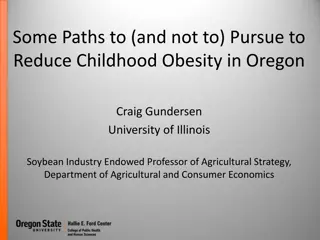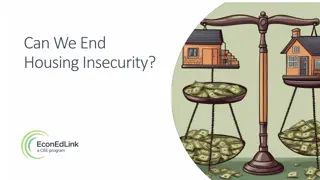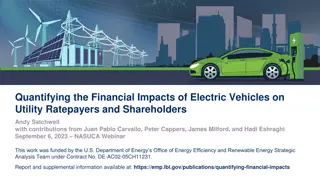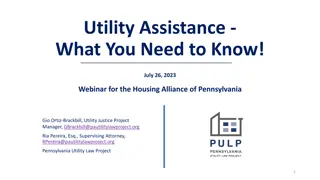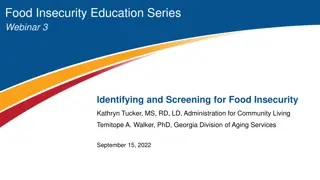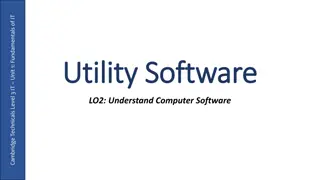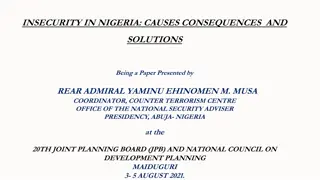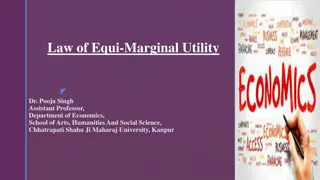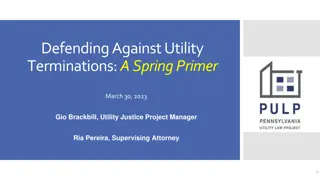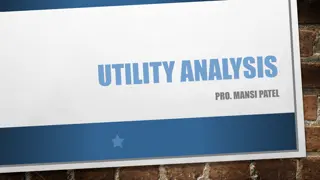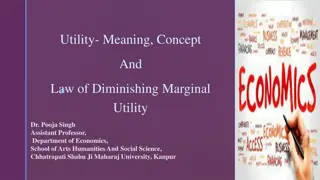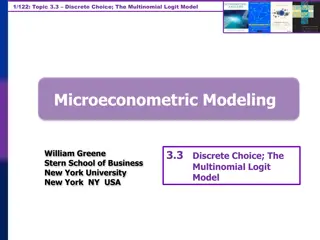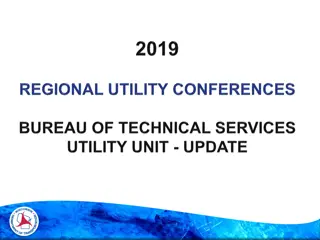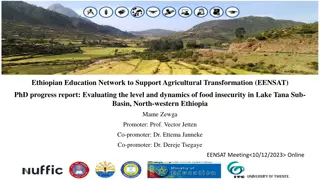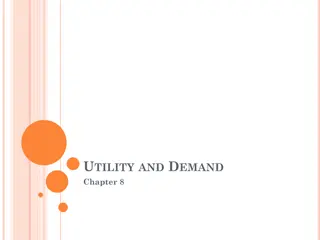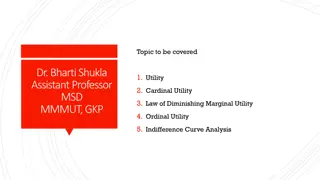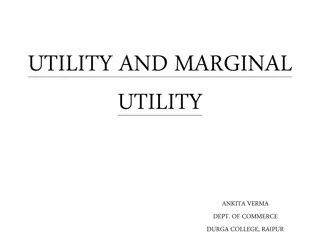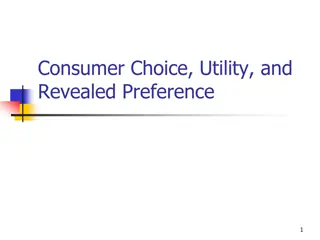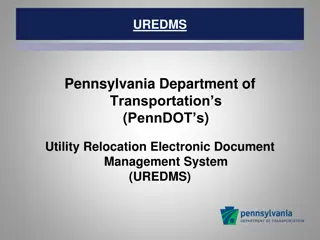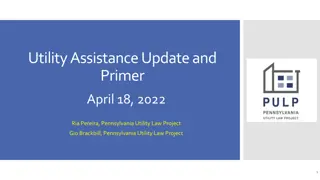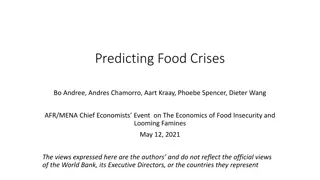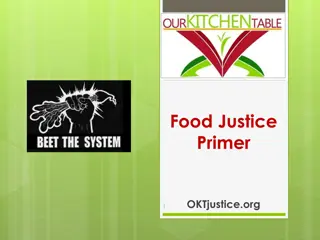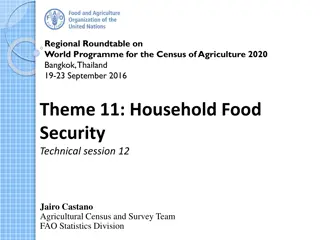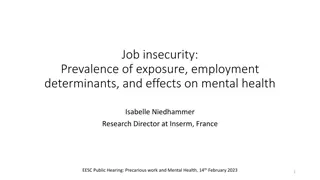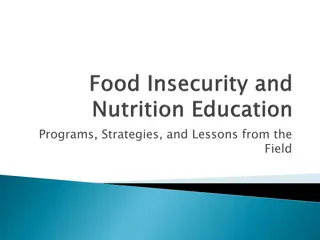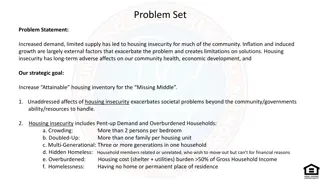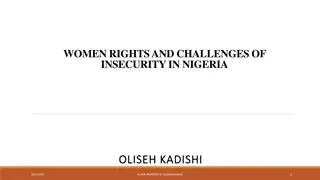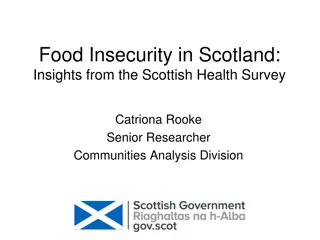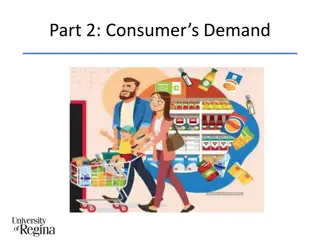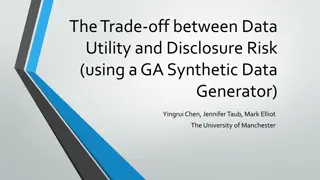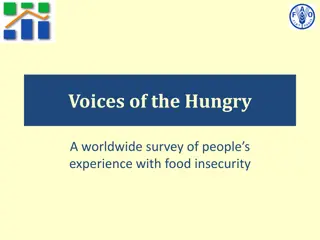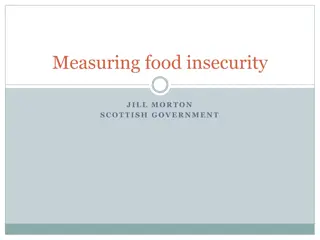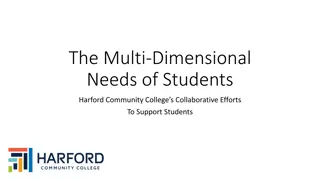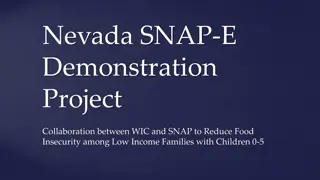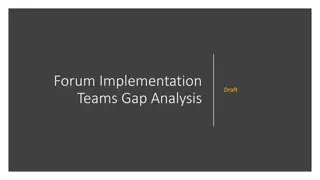Strategies to Address Childhood Obesity and Food Insecurity in Oregon
Various paths to reduce childhood obesity and food insecurity in Oregon are discussed, including the impact of SNAP, soda taxes, and key objectives to focus on. The importance of ensuring interventions do not cause harm over other dimensions is highlighted. The evidence on soda taxes, SNAP program,
6 views • 10 slides
Addressing Housing Insecurity: Efficiency vs. Equity
Today's lesson delves into the pressing issue of housing insecurity affecting over 650,000 Americans. The discussion covers economic efficiency and equity, emphasizing the need for balanced policymaking. Two options are presented: expanding an existing homeless shelter to accommodate more individual
0 views • 12 slides
Financial Impacts of Electric Vehicles on Utility Ratepayers and Shareholders
Analysis funded by the U.S. Department of Energy examines the effects of electric vehicle adoption on utility finances, including ratepayer and shareholder impacts. The study delves into customer EV adoption, utility revenue collection, and investment value. Various charging strategies and utility c
0 views • 21 slides
Understanding Utility Assistance and Support in Pennsylvania
Gain insights into utility assistance initiatives in Pennsylvania through the perspective of the Pennsylvania Utility Law Project. Topics covered include regulated vs. unregulated utilities, affordability issues, tenant protections, and the impact of utility insecurity on various aspects of life. Di
1 views • 32 slides
Food Insecurity Education Series Webinar: Identifying and Screening Insights
Explore the significance of assessing food insecurity, different screening methods, and the impact of food insecurity on health outcomes. Understand the levels and factors influencing food insecurity, along with the importance of screening in addressing and combating this critical issue.
1 views • 30 slides
Understanding Utility Software in IT Systems
Utility software plays a crucial role in maintaining and configuring computer systems. This unit focuses on key utility software types like defragmentation, backups, compression, anti-virus, and encryption. Understanding the purpose, features, advantages, and disadvantages of utility software is ess
0 views • 9 slides
Addressing Insecurity in Nigeria: Causes, Consequences, and Solutions
National security in Nigeria is crucial for economic and social development. The government is facing multifaceted insecurities across the country, requiring a whole-of-government and whole-of-society approach. Insecurity threats include terrorism, armed banditry, clashes, and organized crimes. A co
1 views • 29 slides
Understanding the Law of Equi-Marginal Utility in Economics
Law of Equi-Marginal Utility, propounded by Hermann Heinrich Gossen, explains how consumers distribute their income among different goods to maximize satisfaction. It involves equalizing the marginal utility per unit of money spent across various goods. The law is based on the assumptions of rationa
0 views • 8 slides
Defending Against Utility Terminations: A Spring Primer
The Pennsylvania Utility Law Project (PULP) provides assistance and advice on residential utility and energy matters for low-income consumers, aiming to ensure equitable access to affordable utility services. PULP offers direct representation, utility assistance program design, and technical assista
0 views • 47 slides
Understanding Utility: Marginal vs. Total Utility
Utility in economics is the satisfaction derived from consuming goods or services. Marginal utility measures the change in total utility as consumption increases, whereas total utility is the sum of satisfaction obtained from consuming different units of a commodity. Consumers aim to maximize total
2 views • 11 slides
Understanding Utility: Meaning, Concept, and Law of Diminishing Marginal Utility
Utility is the satisfaction or well-being a consumer derives from consuming goods or services. Total utility is the sum of satisfactions, while marginal utility is the additional satisfaction from one more unit consumed. Utility can be measured and ranked but not numerically. The Law of Diminishing
3 views • 9 slides
Microeconometric Modeling with Multinomial Logit Model
The topic discusses the Multinomial Logit Model in the context of discrete choice modeling, covering concepts, models, consumer preferences, utility maximization, and implications for discrete choice models. It explores how consumers maximize utility under budget constraints, the need for well-defin
1 views • 58 slides
WisDOT Utility Coordination Efforts for Statewide Projects
WisDOT is testing new processes using DocuSign for utility coordination in statewide projects, aiming to streamline procedures and reduce over-processing. Shane Smith and Dylan Gates are leading the testing phase with utility companies to gather feedback and improve the system. The team's goal is to
5 views • 20 slides
Progress Report on Evaluating Food Insecurity in Lake Tana Sub-Basin, Ethiopia
PhD progress report discusses the evaluation of food insecurity dynamics in Lake Tana Sub-Basin, Ethiopia. Objectives include analyzing rural household food security, quantifying soil erosion effects, and assessing drought impacts. Challenges such as political instability are highlighted, with ongoi
0 views • 6 slides
Understanding Consumer Choices and Utility Maximization
Exploring how consumers make consumption decisions based on utility theory, marginal utility, and preferences. Analyzing Lisa's consumption possibilities, total utility, and marginal utility to illustrate economic concepts. Discussing the utility-maximizing rule for optimal decision-making in spendi
0 views • 22 slides
Understanding Utility Theory in Economics
Utility theory in economics explores the concept of utility, which refers to the satisfaction or want-satisfying capacity a commodity provides to consumers. It is subjective, relative, and can vary among individuals. Cardinal utility analysis quantifies utility in numbers, while total utility and ma
3 views • 13 slides
Addressing Food Insecurity Among Underserved Communities in Allegheny County
High rates of food insecurity, especially among children, pose serious health and social risks in underserved communities like Braddock, PA. Home-based child care providers face challenges in providing healthy meals, exacerbated by factors like lack of participation in state programs. Ellen Lomax, a
0 views • 27 slides
Understanding Utility and Marginal Utility in Economics
Utility refers to the satisfaction a consumer receives from consuming commodities. It is a subjective concept that can be measured through cardinal or ordinal approaches. Cardinal approach involves measuring utility numerically, while ordinal approach orders levels of satisfaction based on utility.
0 views • 16 slides
Understanding Consumer Choice and Utility Theory
Explore the concepts of consumer choice, utility, and revealed preference in economics. Learn how utility functions help us rank the desirability of consuming different bundles of goods. Discover the mathematical representation of utility and see examples of representing utility in terms of goods co
0 views • 69 slides
PennDOT UREDMS - Utility Relocation Electronic Document Management System
PennDOT's UREDMS (Utility Relocation Electronic Document Management System) is an electronic document management system used for utility relocations. It functions as a virtual filing cabinet, allowing for easier search, faster retrieval, and better revision control of important documents. The system
1 views • 15 slides
Utility Assistance Update and Primer - PULP Focus on Low-Income Residential Utility in Pennsylvania
Today's webinar presented by Pennsylvania Utility Law Project (PULP) focused on LIHEAP programs, tools for preventing termination, and special protections for utility customers. It covered the Winter Moratorium ending, LIHEAP basics, eligibility criteria for cash grants, and more to assist low-incom
0 views • 50 slides
Southern Nevada Community Meeting on White House Hunger Conference
The City of Las Vegas hosted a community meeting to address food insecurity and access issues in Southern Nevada, in support of the White House Hunger Conference. The meeting aimed to empower consumers, improve food access and affordability, integrate nutrition and health, enhance food security rese
0 views • 17 slides
Predicting Food Crises: A Comprehensive Analysis
Food insecurity is a significant issue, especially in developing regions like Africa, exacerbated by factors such as climate change and population growth. Despite the importance of early prevention, there is limited literature on predicting food crises, unlike conflict outbreaks. This study by Bo An
0 views • 15 slides
Understanding Food Justice and Insecurity: A Comprehensive Overview
Food Justice Primer provides insightful definitions and discussions on key concepts such as food justice, food insecurity, food sovereignty, and food deserts. It highlights the need for equitable sharing of benefits and risks in the food system, aiming to transform current disparities and inequities
0 views • 49 slides
Innovations in Measuring Household Food Security: FIES Approach
Household food security is a fundamental aspect of well-being, yet challenging to measure accurately. The Food Insecurity Experience Scale (FIES) offers a new approach developed by the FAO, aiming to assess food insecurity experiences through specific questions. This innovative method provides valua
0 views • 19 slides
Understanding Job Insecurity and Its Impact on Mental Health
Job insecurity is defined as the fear of job loss, a prevalent issue in Europe with significant variations between countries. Factors contributing to job insecurity include temporary work contracts, low education levels, and certain industries. Research shows a strong association between job insecur
0 views • 9 slides
Food Insecurity Programs and Strategies: A Comprehensive Analysis
Explore the various programs, strategies, and lessons in the field of addressing food insecurity, including insights on different levels of food security, statistics on insecure households, and initiatives like the National School Lunch Program and Emergency Food Assistance Program. Learn about the
0 views • 25 slides
Addressing Housing Insecurity Challenges in the Community
Increased demand and limited supply have led to housing insecurity in the community, impacting health, economic development, and overall well-being. Factors such as inflation, induced growth, and societal issues exacerbate the problem, causing long-term adverse effects. The goal is to increase attai
0 views • 7 slides
Women's Rights and Challenges of Insecurity in Nigeria
Women in Nigeria face various challenges due to insecurity, impacting their fundamental rights. This study explores the historical context, state of insecurity, causes, effects on women, and potential solutions. Insecurity, including conflicts and violence, has significantly infringed upon women's r
1 views • 23 slides
Insights into Food Insecurity in Scotland from the Scottish Health Survey
The Scottish Health Survey provides valuable insights into food insecurity in Scotland, highlighting statistics on poverty, destitution, and food aid distribution. Efforts to measure household food insecurity systematically are discussed, with a focus on promoting awareness and addressing the issue
1 views • 15 slides
Understanding Consumer Demand: From Utility Theory to Behavior in the Marketplace
We delve into the relationship between utility theory and consumer demand, exploring how individuals' tastes, preferences, and budget constraints influence their choices. Through examples like Neal's decision between snowboarding and jazz, we see how utility translates into demand curves, guiding co
0 views • 17 slides
Challenged National Sovereignty: Addressing Insecurity in Central America
This research delves into the challenges to national sovereignty, regional coordination, and global influence in Central America, focusing on the issue of insecurity. It explores how security could serve as a foundation for greater regional integration, proposing the Central American Security Strate
0 views • 13 slides
Understanding the Trade-off between Data Utility and Disclosure Risk
This study explores the balance between data utility and disclosure risk using a GA synthetic data generator. The authors delve into measuring utility and risk, emphasizing structured categorical data. They define synthetic data, discuss utility assessment methods, and outline how to measure data ut
0 views • 30 slides
Worldwide Survey on Food Insecurity: Voices of the Hungry
A survey conducted by the Food and Agriculture Organization of the United Nations monitoring worldwide food security challenges, focusing on the prevalence of undernourishment. The survey highlights the complexity of measuring food insecurity and the need for global and national monitoring to suppor
0 views • 26 slides
Understanding Food Insecurity Measurement in Scotland
The report emphasizes the importance of understanding and addressing food insecurity effectively in Scotland. It discusses the dignity in ending hunger, the rights to nutritious food, and the limitations of emergency food aid. The Food Insecurity Experience Scale is highlighted as a tool for measuri
0 views • 7 slides
Addressing Student Needs at Harford Community College
Harford Community College is dedicated to supporting the multi-dimensional needs of its students. The institution has implemented various initiatives and resources to address challenges such as food insecurity, housing, transportation, job flexibility, technology access, and mental health support. T
0 views • 8 slides
Addressing Food Insecurity at Trocaire College: Initiatives and Support Programs
Trocaire College, a Catholic and Mercy institution in Western New York, faces food insecurity among its student population. Research data shows high poverty rates. Initiatives such as Catherine's Cupboard, a food pantry, and the Student Emergency Fund aim to support students facing food insecurity a
0 views • 4 slides
Collaborative Efforts to Reduce Food Insecurity Among Low-Income Families with Children
Nevada SNAP-E Demonstration Project, in collaboration with WIC, aims to reduce food insecurity among low-income families with children aged 0-5. The project is part of the Healthy Hunger Free Kids Act (HHFKA), which provides funding to research childhood hunger causes, test innovative strategies, an
0 views • 29 slides
The Challenge of Food Insecurity and Malnutrition
Humans transitioned from hunting/gathering to agriculture, leading to overproduction of food globally. Despite this, around 1 billion people suffer from food insecurity due to poverty, unequal distribution, political factors, and natural disasters. Malnourishment and undernourishment remain prevalen
0 views • 10 slides
Draft - Early Thinking on Gaps in Food Insecurity Implementation
The draft outlines early thinking on gaps in food insecurity implementation, focusing on expand produce purchasing initiatives and prioritize Washington-grown products. Recommendations include actions to increase purchasing power at the county level and boost participation in nutrition programs. Fun
1 views • 34 slides
